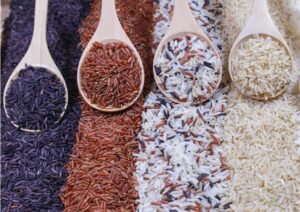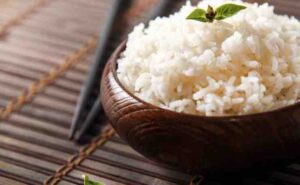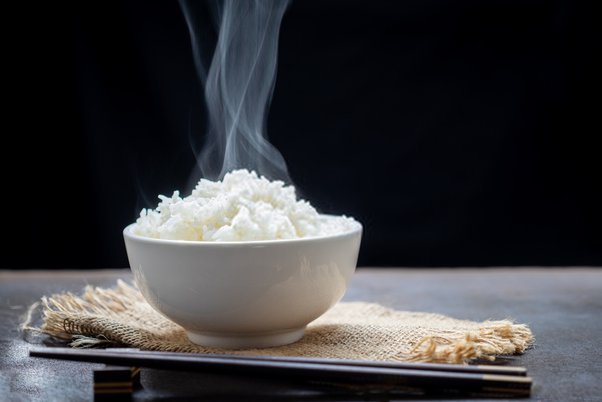Do you think that eating rice will make you gain weight? If so, you’re not alone. A lot of people believe that rice is fattening and unhealthy. However, this isn’t actually the case. In fact, rice can be a part of a healthy diet if it’s eaten in the right way. In this blog post, we will discuss how rice affects weight and dispel some of the myths about this grain. Stay tuned for more information!
Contents
Understanding Rice
 Rice is a complex carbohydrate. This means that it is made up of long chains of sugar molecules. When you eat rice, your body breaks down these chains into glucose, which is then used for energy.
Rice is a complex carbohydrate. This means that it is made up of long chains of sugar molecules. When you eat rice, your body breaks down these chains into glucose, which is then used for energy.
Complex carbohydrates are an important part of a healthy diet because they provide your body with a slow and steady source of energy. They also promote gut health and help to regulate blood sugar levels. However, not all complex carbohydrates are created equal.
Refined carbs like white bread and pasta have been stripped of their nutrients and fiber, which can cause them to be digested quickly and lead to spikes in blood sugar levels. On the other hand, unrefined carbs like brown rice contain all of their natural nutrients and fiber. This makes them a more slowly digested and healthier option.
Different varieties of rice
Rice is known to cause weight gain because it is high in carbohydrates. However, not all types of rice are equally fattening. In fact, there are three main types of rice:
White Rice
White rice is the most refined type of rice. It has been stripped of its bran and germ, which contain most of the grain’s nutrients and fiber. This makes white rice less nutritious than other types of rice. White rice is also more likely to be digested quickly, which can cause spikes in blood sugar levels.
Brown Rice
Brown rice is a whole grain that has been minimally processed. It still contains bran and germ, which makes it more nutritious than white rice. Brown rice is a good source of fiber and minerals, and it has a lower glycemic index than white rice. This means that it is less likely to cause spikes in blood sugar levels.
Wild Rice
Wild rice is not actually a type of rice, but grass. It is higher in protein and fiber than other types of rice. Wild rice also has a lower glycemic index, making it a good option for people with diabetes or prediabetes.
Other types of rice include:
- Basmati rice
- Jasmine rice
- Arborio rice
All these types of rice have different nutritional profiles. Some are more processed than others, and some have a higher glycemic index.
Effects Of Rice On Weight
Rice is a staple food in many cultures and has been shown to have some health benefits. However, there is also some research that suggests that rice may contribute to weight gain.
One study found that eating rice was associated with an increased risk of obesity. The study participants who ate the most rice were more likely to be overweight or obese than those who ate less rice.
Another study found that people who ate white rice had a higher risk of type II diabetes than people who ate other types of carbohydrates. This is because white rice has a high glycemic index, which means it raises blood sugar levels quickly.
We can say that rice does affect weight, but not in the way most people think. Rice can be a part of a healthy diet, but it’s important to eat it in moderation and to choose whole grain varieties when possible.
How Much Rice Should You Eat?
 The amount of rice you should eat depends on a few factors, including your weight loss goals and your daily calorie needs. If you’re trying to lose weight, you may want to limit yourself to one or two servings of rice per day.
The amount of rice you should eat depends on a few factors, including your weight loss goals and your daily calorie needs. If you’re trying to lose weight, you may want to limit yourself to one or two servings of rice per day.
One cup of cooked white rice has about 200 calories, which is not a lot. However, if you eat two or three cups of rice per day, those calories can add up. And if you’re eating other high-calorie foods as well, you may have trouble losing weight.
A healthy serving of rice is a one-half cup, which is about the size of a deck of cards. If you’re eating more than that, you may want to cut back. You can also add vegetables or lean protein to your meal to make it more filling and satisfying.
Other Benefits Of Rice
In addition to its potential effects on weight, rice may also have some other health benefits. Some of the nutrients in rice include:
- B vitamins
- Iron
- Potassium
- Manganese
- Selenium
Rice is also a good source of fiber, which can help with digestion. And because it’s low in calories, it can be a good food for people who are trying to lose weight.
Other benefits of rice may include that it is:
A good source of energy
Rice is a good source of complex carbohydrates, which are a type of nutrient that is broken down slowly and used for energy. It is also a good source of B vitamins, which are needed for energy production. You can get these benefits by eating brown rice, wild rice, or white rice.
Easy to digest
Rice is a good food for people who have trouble digesting other foods. This is because it is low in fiber and doesn’t contain any gluten. An easily digestible food is especially important for people who have gastrointestinal disorders, such as Crohn’s disease or ulcerative colitis.
Inexpensive
Rice is a very inexpensive food, especially when compared to other grains. This makes it a good option for people who are on a budget. It is easily available in most stores at a very reasonable price. Irrespective of the type, rice is healthy and affordable food.
Versatile
Rice can be used in a variety of dishes, from savory to sweet. It can be stir-fried, boiled, baked, or even made into sushi. And because it is so versatile, it can be a good option for people who are on special diets or have food allergies. It can be paired with almost any type of food.
It can be easy to add rice to your diet, but it’s important to remember that it is starch and should be eaten in moderation.
The Rice Diet
 The rice diet was created in 1939 by Dr. Walter Kempner, a Duke University physician, to treat obesity and heart disease. The diet is based on eating rice, fruits, and vegetables while limiting fat and calories.
The rice diet was created in 1939 by Dr. Walter Kempner, a Duke University physician, to treat obesity and heart disease. The diet is based on eating rice, fruits, and vegetables while limiting fat and calories.
The Rice Diet has been shown to be effective for weight loss and improving heart health. A study published in the Journal of the American Medical Association found that people who followed the Rice Diet lost an average of 13 pounds after six weeks. The diet also improved their cholesterol levels and blood pressure.
However, the Rice Diet is not without its critics. Some experts say that it is too restrictive and can lead to nutrient deficiencies. They also point out that the diet does not teach people how to make healthy choices for long-term weight loss.
If you are considering the Rice Diet for weight loss, talk to your doctor first. He or she can help you decide if it is right for you.
Limitations Of Consumption Of Rice
If you are struggling with your weight, you may be wondering if rice is to blame. After all, it is a starch, and starch has been demonized by the low-carb diet craze. However, before you banish rice from your diet, it’s important to understand how it affects weight.
Few limitations are placed on rice consumption, making it easy to overindulge. A cup of cooked rice has around 200 calories, which is not a lot in the grand scheme of things. However, if you eat multiple servings or add toppings like butter, gravy, or soy sauce, the calorie count can quickly increase.
Another problem with rice is that it is very easy to overeat. It’s hard to stop at just one serving when the grains are so light and fluffy. If you’re trying to lose weight, it’s important to be mindful of how much rice you’re eating. One way to do this is to measure out a single serving before cooking and avoid going back for seconds.
You should also try to choose alternatives over white rice. White rice is highly refined and has had the bran and germ removed. This removal process strips away some of the rice’s nutrients and fiber.
How To Choose The Right Type Of Rice?
 When it comes to weight, not all types of rice are created equal. In fact, some types of rice can actually help with weight loss. Here’s a look at the different types of rice and how they affect weight.
When it comes to weight, not all types of rice are created equal. In fact, some types of rice can actually help with weight loss. Here’s a look at the different types of rice and how they affect weight.
Basmati rice is one of the most popular types of rice, but it’s also one of the worst for weight loss. Basmati rice is very high in carbohydrates and has a glycemic index of 87, making it one of the most fattening types of rice.
Brown rice is a much better option for weight loss. It has a lower glycemic index than white or basmati rice, and it’s also packed with fiber and nutrients. Brown rice can help you feel full and satisfied after meals, helping you eat less overall.
If you’re looking to lose weight, jasmine or sushi rice is your best bet. These types of rice have a very low glycemic index, meaning they won’t cause spikes in blood sugar levels. Jasmine and sushi rice are also both high in fiber, which can help with weight loss.
Conclusion
Rice does not necessarily make you fat. It is a calorie-dense food, so it can contribute to weight gain if you eat too much of it. However, there are many factors that affect weight, and rice is just one of them. If you’re trying to lose weight, pay attention to your overall diet and activity level, and don’t fixate on any one food. There’s no need to avoid rice if you’re trying to lose weight.
So, does rice make you fat? The answer is a resounding no! Rice is actually a very healthy food that can help with weight loss. Just be sure to cook it properly and pair it with other healthy foods. Then watch the pounds melt away!
For more such healthy foods and weight management tips, you can choose to contact Mantra Care. We can help you develop a healthy weight management program that is tailored to your specific needs and goals. You can also get in touch with our nutrition experts and expert dietitians through our online nutrition counseling, who can guide you through the process and help you achieve your fitness goals. Mantra Care is here to help you on your journey to a healthier, happier life! Contact us today to get started.


